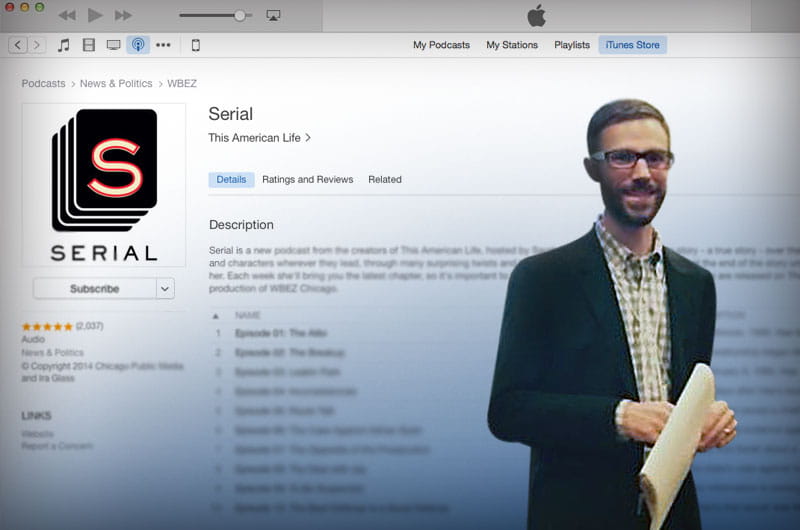"Serial" and Grim Media: A Q&A With Jordan McClain
 By Frank Otto
By Frank Otto

- Fashion Icon Mary McFadden 'The High Priestess of High Fashion' Exhibition Opens at Drexel
- Drexel’s Pearlstein Gallery Offers Spring Exhibitions Centered on the Healing Properties of Art and Creative Works
- Q&A: Dawn Medley on How Drexel is Tackling the FAFSA Delay
- The First Exhibition of Contemporary Nepali Artists in the U.S. Debuts in Drexel’s Pearlstein Gallery

The podcast “Serial” broke onto the scene in October and immediately captivated a huge audience intrigued by a story of murder, fuzzy memories, outright lies and the search for the actual truth.
A spin-off of National Public Radio’s mainstay “This American Life,” the podcast details reporter Sarah Koenig’s investigation into a Baltimore murder dating back to 1999. Although a man was convicted, the podcast is open-ended as Koenig encounters twists and turns in each episode.
It is just the latest in a string of media in recent years that deals frankly with darker subject matter. DrexelNow spoke with Jordan McClain, PhD, professor in the Department of Communication, about “Serial” and the public’s growing fascination with darker stories and grim details.
First, what do you, personally, think of “Serial?”
I think it’s done a wonderful job of playing with the still-emerging podcast form and cleverly serializing an investigative story that appeals to the masses. I love listening to “Serial” because I am a big fan of podcasts and this one has it all: an entertaining host, professional production, quality reporting, a compelling focus, and even good music.
Can you compare it to anything else you've watched or listened to?
It’s like a crime reporter’s blog meets the longest “Dateline” episode ever, plus the captivating power of a great audiobook, mixed with the impact of old serialized radio and the charm of good, modern public radio.
Many people use the word “addicting” when describing “Serial.” What do you think makes it so?
I believe it’s probably a few things. One is the serialized format that produces a seemingly endless story to explore. Everything from old Dickens stories to radio dramas to the TV show “Lost” has shown this can get people hooked — despite doubters fearful of alienating audiences who won’t keep up. Ease of access helps, too, since podcasts work well with mobile devices and the show is, essentially, free.
“Serial” comes out at a time when other forms of media with pretty grim subject matter are pretty popular (e.g. "Gone Girl” [the book and movie] and “True Detective”). What do you think makes media dealing with unpleasant subjects so popular?
As the prevalence and popularity of violent media content — movies, news, video games — has increased in America, many have become desensitized to disturbing subject matter. This makes it harder for content producers to get people’s attention or shock them. As a result, a lot of entertainment media will naturally try to seem more real or extreme and push the latest limit to get people talking. I think the examples you cited are good illustrations of this.
Let’s say “Serial" was a happy story building up to what appears to be a happy ending: would it be as popular?
It’s hard to say. Bad news sells, but so do laughs. Sometimes you just want to escape in the mystery of something like the “Serial” podcast and, other times, well, that’s when you turn on the “Nerdist” podcast.
The “gritty” trend, do you feel that still has a lot of steam or will we see a new cycle come in?
American media content has only become more extreme over time, so I’m sure people will continue to make horror movies more shocking, YouTube videos more crazy, and even public radio podcasts more gritty.
There's a second season of “Serial” already announced. Do you think it will be as successful as this season or will this follow the law of diminishing returns?
Based on the positive critical reactions and remarkably enthusiastic fans, I expect the next season will easily find a huge audience. If “Serial” was a racehorse, I’d be betting on it. I can’t wait to hear what they do next.
In This Article
Drexel News is produced by
University Marketing and Communications.